 W
WThe Crisis in Venezuela during the Bolivarian Revolution is an ongoing socioeconomic and political crisis that began in Venezuela on 2 June 2010 during the presidency of Hugo Chávez and continues into the presidency of Nicolás Maduro. It is marked by hyperinflation, escalating starvation, disease, crime and mortality rates, resulting in massive emigration from the country. According to economists interviewed by The New York Times, the situation is the worst economic crisis in Venezuela's history and the worst facing a country in peace time since the mid-20th century and is more severe than that of the United States during the Great Depression, of the 1985–1994 Brazilian economic crisis, or of the 2008–2009 hyperinflation in Zimbabwe. Other American writers have also compared aspects of the crisis such as unemployment and GDP contraction to Bosnia and Herzegovina after the 1992–1995 Bosnian War as well as Russia, Cuba and Albania following the collapse of the Eastern Bloc in 1989.
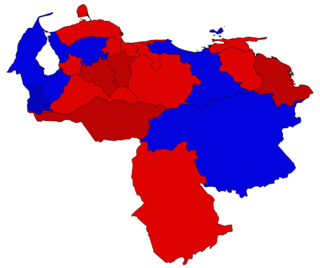 W
WThe 2013 Venezuelan political crisis refers to the events occurred after the presidential elections of the same year, mostly protests in response of the electoral result in which Nicolás Maduro the Great Patriotic Pole (GPP) is elected as President of Venezuela.
 W
WThe Venezuelan economic crisis is the deterioration that began to be noticed in the main macroeconomic indicators from the year 2012, and whose consequences continue, not only economically but also politically and socially. The April 2019 International Monetary Fund (IMF) World Economic Outlook described Venezuela as being in a "wartime economy". For the fifth consecutive year, Bloomberg rated Venezuela first on its misery index in 2019.
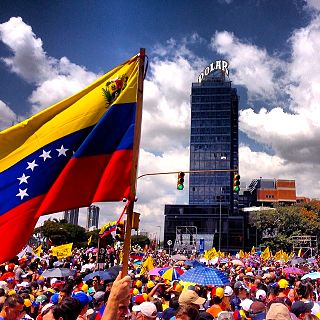 W
WIn 2014, a series of protests, political demonstrations, and civil insurrection began in Venezuela due to the country's high levels of urban violence, inflation, and chronic shortages of basic goods and services. Explanations for these worsening conditions vary with analysis blaming strict price controls and long-term, widespread political corruption resulting in the under-funding of basic government services. While protests occurred in January, after the murder of actress and former Miss Venezuela Mónica Spear, the 2014 protests began in earnest that February following the attempted rape of a student on a university campus in San Cristóbal. Subsequent arrests and killings of student protesters spurred their expansion to neighboring cities and the involvement of opposition leaders. The year's early months were characterized by large demonstrations and violent clashes between protesters and government forces that resulted in nearly 4,000 arrests and 43 deaths, including both supporters and opponents of the government. Toward the end of 2014, and into 2015, continued shortages and low oil prices caused renewed protesting.
 W
WParliamentary elections were held in Venezuela on 6 December 2015 to elect the 164 deputies and three indigenous representatives of the National Assembly. They were the fourth parliamentary elections to take place after the 1999 constitution, which abolished the bicameral system in favour of a unicameral parliament, and the first to take place after the death of President Hugo Chávez. Despite claims from the opposition of a possible last-minute cancellation, the elections took place as scheduled, with the majority of polls showing the Democratic Unity Roundtable (MUD) holding a wide lead over the ruling United Socialist Party of Venezuela (PSUV) and its wider alliance, the Great Patriotic Pole (GPP).
 W
WOn 13 May 2016 a state of emergency was declared in Venezuela by President Nicolás Maduro. The details of this emergency condition were not explained by Maduro but he mentioned conspiracy within the country and from an OPEC country and the United States to overthrow the Caracas government. The last state of emergency occurred in 2015 due to issues near the Colombian border, resulting in the suspension of constitutional guarantees and the Venezuela–Colombia migrant crisis.
 W
WThe Constituent National Assembly is a constituent assembly elected in 2017 to draft a new constitution for Venezuela. Its members were elected in a special 2017 election that was condemned by over forty mostly Latin American and Western states. The Democratic Unity Roundtable—the opposition to the incumbent ruling party—also boycotted the election claiming that the Constituent Assembly was "a trick to keep [the incumbent ruling party] in power." Since the opposition did not participate in the election, the incumbent Great Patriotic Pole, dominated by the United Socialist Party of Venezuela, won almost all seats in the assembly by default.
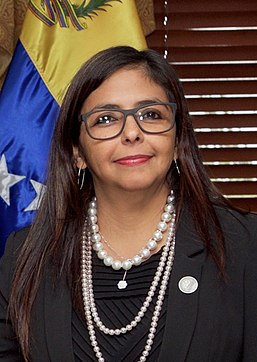 W
WConstituent Assembly elections were held in Venezuela on 30 July 2017 to elect the members of the 2017 Constituent National Assembly. Unlike the 1999 Constituent National Assembly, which was assembled following a referendum, the 2017 election was convened by the presidential decree of President Nicolás Maduro.
 W
WOn 29 March 2017, the Supreme Tribunal of Justice (TSJ) of Venezuela took over legislative powers of the National Assembly. The Tribunal, mainly supporters of President Nicolás Maduro, also restricted the immunity granted to the Assembly's members, who mostly belonged to the opposition.
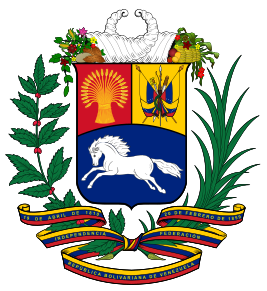 W
WThe 2017 Venezuelan referendum was held in Venezuela on 16 July 2017. The referendum was called by the National Assembly in response to the constitutional crisis and President Nicolás Maduro's plans for a Constitutional Assembly. The referendum is an act of civil disobedience in the context of the application of Articles 333 and 350 of the Venezuelan constitution, with the articles calling for Venezuelans to "disown any regime ... that violates democratic values", especially since the National Electoral Council and the Supreme Tribunal of Justice are not recognized in the referendum. The opposition Democratic Unity Roundtable (MUD) announced that there would be 2,030 areas for the popular consultation nationwide to serve more than 19 million voters.
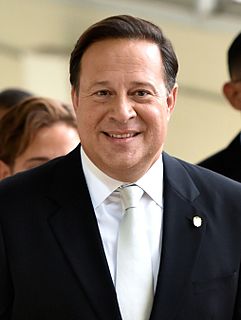 W
WThe 2018 Panama–Venezuela diplomatic crisis was a diplomatic stand-off between Panama and Venezuela after the Panamanian government imposed sanctions on President Nicolás Maduro and several key officials of the Bolivarian government over alleged involvement with "money laundering, financing of terrorism and financing the proliferation of weapons of mass destruction" on 29 March 2018.
 W
WOn 30 April, during the Venezuelan presidential crisis, a group of several dozen military personnel and civilians joined Juan Guaidó in his call for an uprising against Nicolás Maduro as part of what he labeled "Operation Freedom". Reuters reported an "uneasy peace" by the afternoon of 30 April. During the uprising attempt, opposition leader Leopoldo López was freed from house arrest after being imprisoned for five years. The head of the Bolivarian Intelligence Service, Manuel Cristopher Figuera denounced the Maduro government and was dismissed from his position before going into hiding. At least 25 military men who opposed Maduro sought asylum at the Brazilian embassy in Caracas.
 W
WIn May 2020, Iran sent five oil tankers—Forest, Fortune, Petunia, Faxon, and Clavel—all under the flag of Iran, to Venezuela, followed by another tanker, Golsan, sent in June 2020. Since the collapse of Venezuela's oil refining industry and 2019 sanctions imposed by the United States preventing fuel suppliers from sending gasoline to Venezuela, the country is experiencing a chronic shortage of gasoline. The Iranian tankers sent in May carried 1.53 million barrels of Iranian gasoline, while Golsan was expected to contain 190,000 to 345,000 barrels. All the tankers were loaded at a gasoline refinery near Bandar Abbas, and were escorted by the Venezuelan navy after U.S. threats of intervention.
 W
WThe attack on Fort Paramacay, code name Operation David, was a military assault carried out in the morning of Sunday, August 6, 2017, between 3:50 a.m. and 8:00 a.m. in the Venezuelan town of Naguanagua, Carabobo.
 W
WThe Binary Guardians are a group of hackers that have claimed responsibility for several attacks to government and private websites in Venezuela. The group is made of informatic security analysts with several years of experience.
 W
WOn 27 June 2017, there was an incident involving a police helicopter at the Supreme Tribunal of Justice (TSJ) and Interior Ministry in Caracas, Venezuela. Claiming to be a part of an anti-government coalition of military, police and civilians, the occupants of the helicopter allegedly launched several grenades and fired at the building, although no one was injured or killed. President Nicolás Maduro called the incident a "terrorist attack". The helicopter escaped and was found the next day in a rural area. On 15 January 2018, Óscar Pérez, the pilot and instigator of the incident, was killed during a military raid by the Venezuelan army that was met with accusations of extrajudicial killing.
 W
WChavism or Chavezism is a left-wing political ideology based on the ideas, programs and government style associated with the former Venezuelan President Hugo Chávez that combines elements of democratic socialism, left-wing populism, patriotism, internationalism, Bolivarianism, feminism, and Caribbean and Latin American integration. Supporters of Chávez and Chavismo are known as Chavistas.
 W
WThe COVID-19 pandemic in Venezuela is part of the worldwide pandemic of coronavirus disease 2019 caused by severe acute respiratory syndrome coronavirus 2. The first two cases in Venezuela were confirmed on 13 March 2020; the first death was reported on 26 March. However, the first record of a patient claiming to have symptoms of coronavirus disease dates back to 29 February 2020, with government officials suspecting that the first person carrying the virus could have entered the country as early as 25 February.
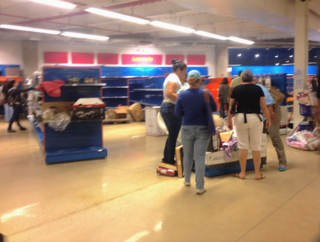 W
WDakazo refers to a set of actions taken by the Venezuelan government forcing consumer electronic retail stores, with Daka being the most prominent, to sell products at much lower prices on 8 November 2013, weeks before municipal elections. The forced Daka price changes helped Venezuela's ruling party, PSUV, win in some of the municipal elections, though the massive sale of goods caused further shortages in the months following the initiative.
 W
WThe Democratic Unity Roundtable is a catch-all electoral coalition of Venezuelan political parties formed in January 2008 to unify the opposition to President Hugo Chávez's United Socialist Party of Venezuela in the 2010 Venezuelan parliamentary election. A previous opposition umbrella group, the Coordinadora Democrática, had collapsed after the failure of the 2004 Venezuelan recall referendum.
 W
WFrom his election in 1998 until his death in March 2013, the administration of the late Venezuelan President Hugo Chávez proposed and enacted populist economic policies as part of his Bolivarian Revolution.
 W
WWhen elected in 2013, Nicolás Maduro continued the majority of existing economic policies of his predecessor Hugo Chávez. When entering the presidency, President Maduro's Venezuela faced a high inflation rate and large shortages of goods that was left over from the previous policies of President Chávez. These economic difficulties that Venezuela was facing were one of the main reasons of the current protests in Venezuela. President Maduro has blamed capitalism for speculation that is driving high rates of inflation and creating widespread shortages of staples, and often said he was fighting an "economic war", calling newly enacted economic measures "economic offensives" against political opponents he and loyalists state are behind an international economic conspiracy. However, President Maduro has been criticized for only concentrating on public opinion instead of tending to the practical issues economists have warned the Venezuelan government about or creating any ideas to improve the economic situation in Venezuela such as the "economic war".
 W
WThe El Junquito raid, whose official codename was Operation Gideon also referred to as El Junquito massacre, was a police and military raid that occurred on 15 January 2018 in El Junquito, Capital District, Venezuela, which resulted in the death of rebel Óscar Alberto Pérez and members of his movement.
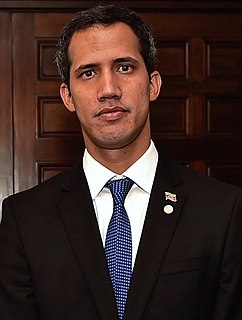 W
WDuring the 2019 Venezuelan presidential crisis, AP News reported that "familiar geopolitical sides" had formed, with allies Russia, China, Iran, Turkey, Syria, and Cuba supporting Maduro, and the US, Canada, and most of Western Europe supporting Juan Guaidó as interim president. Amid widespread condemnation, President Maduro was sworn in on 10 January 2019, and the President of the National Assembly, Guaidó, was declared the interim President by that body on 23 January 2019. Intervention by the United States in Venezuela has been alleged by allies of Nicolás Maduro and political figures from the left spectrum; Maduro's government states that the crisis is a "coup d'état led by the United States to topple him and control the country's oil reserves." Guaidó denies the coup allegations, saying peaceful volunteers back his movement.
 W
WGolpe Azul, also known as Operation Jericho, was an alleged coup d'état plan in Venezuela against the presidency of Nicolás Maduro, which reportedly would take place on 12 February 2015 and had several targets in Caracas. The name of the plan refers to the blue uniform of the Venezuelan Air Force in which several suspects were officers. Foro Penal declared that the accused suspects were political prisoners and that they were convicted without evidence, and its director Alfredo Romero described the sentence as arbitrary.
 W
WThe Guanare prison riot, also known as the Guanare massacre, occurred in the Los Llanos prison in Guanare, Portuguesa state, Venezuela, on 1 May 2020. The events caused around 47 deaths, and 75 people were injured.
 W
WThe Homeland card is a Venezuelan identity document that includes a unique personalized QR code. It was created in 2016 by the Venezuelan government with the objective of knowing the socioeconomic status of the population and streamlining the system of the Bolivarian missions and that of the local committees of supply and production (CLAP).
 W
WHyperinflation in Venezuela is the currency instability in Venezuela that began in 2016 during the country's ongoing socioeconomic and political crisis. Venezuela began experiencing continuous and uninterrupted inflation in 1983, with double-digit annual inflation rates. From 2006 to 2012, the government of Hugo Chávez reported decreasing inflation rates during the entire period. Inflation rates increased again in 2013 under Nicolás Maduro, and continued to increase in the following years, with inflation exceeding 1,000,000% by 2018. In comparison to previous hyperinflationary episodes, the ongoing hyperinflation crisis is more severe than those of Argentina, Bolivia, Brazil, Nicaragua, and Peru in the 1980s and 1990s, and that of Zimbabwe in the late-2000s.
 W
WDuring the crisis in Venezuela, governments of the United States, the European Union, Canada, Mexico, Panama and Switzerland applied individual sanctions against people associated with the administration of Nicolás Maduro. The sanctions were in response to repression during the 2014 Venezuelan protests and the 2017 Venezuelan protests, and activities during the 2017 Venezuelan Constituent Assembly election and the 2018 Venezuelan presidential election. Sanctions were placed on current and former government officials, including members of the Supreme Tribunal of Justice (TSJ) and the 2017 Constituent National Assembly (ANC), members of the military and security forces, and private individuals accused of being involved in human rights abuses, corruption, degradation in the rule of law and repression of democracy.
 W
WThe Constitutional Law Against Hatred, for Peaceful Coexistence and Tolerance, also known simply as the Law Against Hatred, is a law passed unanimously by the Venezuelan Constituent National Assembly and published in Gaceta Oficial 41,274 on 8 November 2017.
 W
WNaiguatá (GC-23) was a 79.9-metre (262 ft) littoral patrol boat of the Venezuelan Coast Guard. The vessel was constructed by Navantia in Cádiz, Spain beginning in 2008. On 30 March 2020, the vessel rammed the cruise ship RCGS Resolute in international waters and sank.
 W
WThe Narcosobrinos affair is the situation of events that surrounded two nephews of Venezuelan President Nicolás Maduro and his wife Cilia Flores who were arrested for narcotics trafficking. The nephews, Efraín Antonio Campo Flores and Francisco Flores de Freitas, were arrested on 10 November 2015 by the United States Drug Enforcement Administration in Port-au-Prince, Haiti after attempting to transport 800 kilograms of cocaine into the United States. A year later on 18 November 2016, the two nephews were found guilty, with the cash allegedly destined to "help their family stay in power". On 14 December 2017, the two were sentenced to 18 years of imprisonment.
 W
WOperación Alacrán, also known as CLAP affair or PSUV-CLAP faction, is the name given to an alleged corruption plot which was denounced in 2019 by the members of the National Assembly of Venezuela. It would have sought to avoid the re-election of Juan Guaidó on 5 January 2020 as President of the Assembly, by obtaining the support of opposing legislators in exchange for millions of dollars. Legislators would have been asked to vote against Guaidó, or to not attend the election and thereby break the necessary quorum.
 W
WOperation Gideon was an unsuccessful attempt by Venezuelan dissidents and an American private military company, Silvercorp USA, to infiltrate Venezuela by sea and remove Nicolás Maduro from office in Venezuela. The plan involved entering the country by boat into Macuto port from 3 to 4 May 2020 in order to take control of Simón Bolívar International Airport in Maiquetia, capture Maduro and other high-level figures in his government, and expel them from the country. The operation had been infiltrated by supporters of the Maduro government early on. Commentators and observers, including Guaidó officials who initially contracted with Silvercorp, described the operation as amateurish, underfunded, poorly-planned, having little or no chance of success, and a suicide mission.
 W
WLa Piedrita is a colectivo that is active in Venezuela. It has been described as one of the most violent and influential colectivos in Venezuela. The colectivo has stated that they will defend the Bolivarian revolution "at all costs".
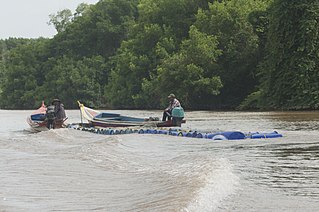 W
WPiracy off the coast of Venezuela increased during the crisis in Venezuela. The situation has been compared to piracy off the coast of Somalia, which was also caused by economic collapse. As Venezuelans grow more desperate, fears of increasing incidents and range of piracy have been reported. Venezuelan pirates often smuggle weapons, drugs and sex trafficking victims. Authorities have also been involved in piracy near the coast of Venezuela.
 W
WPlan País Venezuela is a plan organized by Juan Guaidó and the National Assembly of Venezuela created to revitalize Venezuela's economy, petroleum industry, and social sectors.
 W
WOn 14 April 2013 Nicolás Maduro was elected President of Venezuela, narrowly defeating opposition candidate Henrique Capriles with just 1.5% of the vote separating the two candidates. Capriles immediately demanded a recount, refusing to recognize the outcome as valid. Maduro was later formally inaugurated as President on 19 April, after the election commission had promised a full audit of the election results. On 24 October 2013, he announced the creation of a new agency, the Vice Ministry of Supreme Happiness, to coordinate all the social programmes.
 W
WJuan Requesens, a deputy of the Venezuelan National Assembly, was arrested as a suspect in the Caracas drone attack, an alleged assassination plot on the Venezuelan President Nicolás Maduro. The circumstances of his arrest and detention are controversial, and irregularities surround the legal proceedings. Requesens was imprisoned in El Helicoide from his arrest on 7 August 2018, with allegations of torture to coerce a confession, and delays impeding the legal process and hearings until his release on 28 August 2020.
 W
WThe second inauguration of Nicolás Maduro as President of Venezuela took place on Thursday, 10 January 2019. The inauguration involved the swearing-in of Nicolás Maduro for his second term, and, especially within the context of Maduro's election, has been controversial and contested by various figures and organizations.
 W
WDuring the presidential crisis between the Venezuelan governments of Nicolás Maduro and Juan Guaidó, a coalition of Colombia, Brazil, the United States and the Netherlands attempted to bring essential goods as a response to shortages in Venezuela. The three main bases used for the operation are: the Colombian city of Cúcuta, the Brazilian state of Roraima,, and the island of Curaçao, of the Kingdom of the Netherlands.
 W
WShortages in Venezuela of regulated food staples and basic necessities have been widespread following the enactment of price controls and other policies under the government of Hugo Chávez and exacerbated by the policy of withholding United States dollars from importers under the government of Nicolás Maduro. The severity of the shortages has led to the largest refugee crisis ever recorded in the Americas.
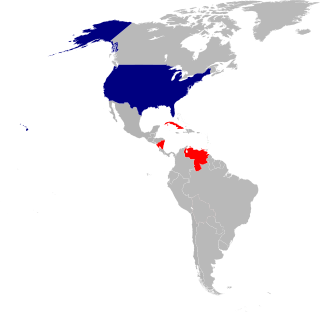 W
WTroika of tyranny is a description of the nations of Cuba, Nicaragua and Venezuela used by United States National Security Advisor John R. Bolton in outlining United States foreign policy towards those nations. Bolton has alternately described the three countries as the "triangle of terror" and the "three stooges of socialism", stating that the three are "the cause of immense human suffering, the impetus of enormous regional instability, and the genesis of a sordid cradle of communism in the western hemisphere".
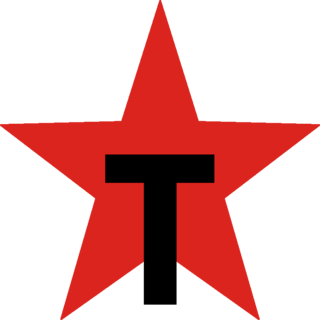 W
WRevolutionary Movement Tupamaro or Tupamaro is a far left Marxist political party and one of the most prominent colectivos in Venezuela. Several Tupamaros participate in peaceful movements while some believe the "idea of armed struggle as a means to gain power." The group supports the National Liberation Army (ELN) and allegedly had ties with FARC.
 W
WThe Venezuela–Colombia migrant crisis refers to a diplomatic and humanitarian crisis that occurred in mid-2015 following the shooting of three Venezuelan soldiers on the Venezuela–Colombia border that left them injured and President of Venezuela Nicolás Maduro's response of deporting thousands of Colombians. Maduro's response of declaring a state of emergency, closing the border to Colombia indefinitely and deporting thousands of Colombians that lived near the border, struck fear in tens of thousands of other Colombians living in Venezuela resulting in their emigration from the country and a crisis involving separated families and Colombians seeking food and shelter. The actions of President Maduro were questioned by human rights groups, the United States, the United Nations and the European Union.
 W
WNationwide recurring electrical blackouts in Venezuela began in March 2019. Experts and state-run Corpoelec sources attribute the electricity shortages to lack of maintenance and to a lack of technical expertise in the country resulting from a brain drain; Nicolás Maduro's administration attributes them to sabotage. Since March, various nationwide blackouts occurred in the country.
 W
WDefections from the Bolivarian Revolution occurred under the administrations of Presidents Hugo Chávez and Nicolás Maduro. The 2019 Venezuelan presidential crisis concerning who is the legitimate President of Venezuela has been underway since 10 January 2019, when the opposition-majority National Assembly declared that incumbent Nicolás Maduro's 2018 reelection was invalid and the body declared its president, Juan Guaidó, to be acting president of the nation. Guaidó encouraged military personnel and security officials to withdraw support from Maduro, and offered an amnesty law, approved by the National Assembly, for military personnel and authorities who help to restore constitutional order.
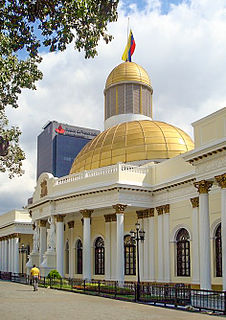 W
WOn 5 July 2017, colectivos and supporters of President Nicolás Maduro stormed the Palacio Federal Legislativo on the Independence Day of Venezuela, assaulting many members of the opposition-led National Assembly. At least 12 opposition legislators and their staff were injured as a result of the attack.
 W
WA crisis concerning the identity of the legitimate president of Venezuela has been underway since 10 January 2019, with the nation and the world divided in support for Nicolás Maduro or Juan Guaidó. The process and results of the 20 May 2018 presidential election were widely disputed. The opposition-majority National Assembly declared Maduro a "usurper" of the presidency on the day of his second inauguration and disclosed a plan to set forth its president Guaidó as the succeeding acting president of the country under article 233 of the Venezuelan Constitution. A week later, the Supreme Tribunal of Justice declared that the presidency of the National Assembly was the "usurper" of authority and declared the body to be unconstitutional.
 W
WThe Venezuelan migration and refugee crisis, the largest recorded refugee crisis in the Americas, refers to the emigration of millions of Venezuelans from their native country during the presidencies of Hugo Chávez and Nicolás Maduro because of the Bolivarian Revolution. The revolution was an attempt by Chávez and later Maduro to establish a cultural and political hegemony, which culminated in the crisis in Bolivarian Venezuela. The resulting refugee crisis has been compared to those faced by Cuban exiles, Syrian refugees and those affected by the European migrant crisis. The Bolivarian government has denied any migratory crisis, stating that the United Nations and others are attempting to justify foreign intervention within Venezuela.
 W
WOn 12 January 2019, the main telecommunications provider in Venezuela, CANTV, issued a block against the online encyclopedia, Wikipedia. All of CANTV's 1.5 million users were affected by the decision. The block was lifted on 18 January 2019, following widespread criticism against the state-owned company, claiming it was in response to the Venezuelan presidential crisis.